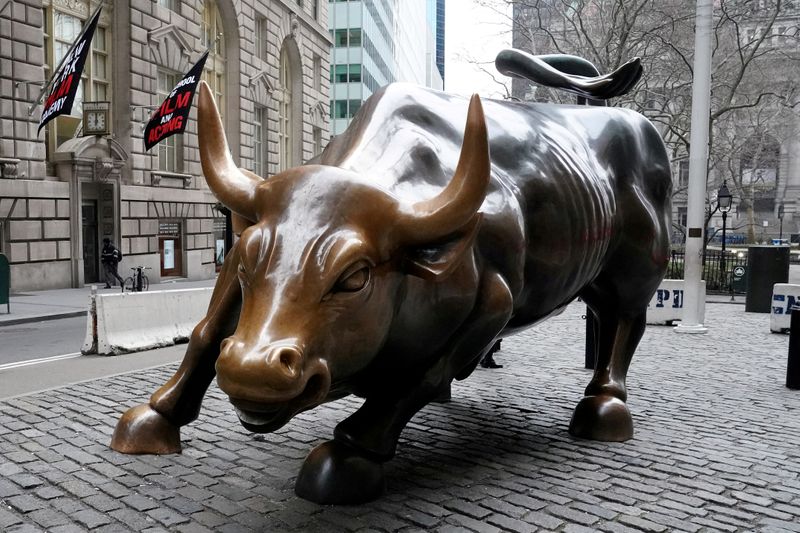By Thyagaraju Adinarayan and Sujata Rao
LONDON (Reuters) - Equity funds have attracted more than half a trillion dollars in the past five months, exceeding inflows recorded over the previous 12 years, according to data from BofA, which has likened the stampede to a "melt-up" in markets.
The flows are also raising fears of a pullback from record highs, given valuations are at the highest since the dotcom bubble of the late 1990s, with the S&P 500 trading at nearly 22 times forward earnings.
"Goldilocks and melt-up are popular terms this week and we think that can be seen through market valuation," said Emmanuel Cau, head of European equity strategy at Barclays (LON:BARC). "We remain optimistic but there’s less upside left in our view."
Deutsche Bank (DE:DBKGn) said this week it expects a 6% to 10% pullback over the next three months as economic growth peaks.
It was followed by a massive $40 million bet in the U.S. options market on Thursday that the Cboe Volatility Index - often called Wall Street's fear gauge - will break above the 25 level and rise towards 40 by mid-July.
The VIX is currently trading around 17 points, the lowest level since early 2020.
"You should definitely be worried about valuations and all the more so when people start justifying extremely high valuations," said Fahad Kamal, chief investment officer at Kleinwort Hambros.
"We are risk-on, but we haven't put our foot down on the accelerator because of valuations in some parts of the market."
SIGNALS OF STRESS
A record $576 billion has flown into equity funds since November -- more than the $452 billion seen in the last 12 years combined, all thanks to ultra-easy monetary policies and unprecedented stimulus.
Kicking off the second-quarter with the second highest earnings multiples in more than a 100 years, many traditional market-top signals, ranging from retail investor surveys to valuations, are flashing amber.
Some of those worries have seeped in, with investors loading $120 billion-plus into cash funds in the last three weeks. But equity asset allocations are still at a record 63.6%, according to BofA.
Kamal, however, said with hopes fading on bonds offering a real return, there is no alternative to stocks.
Still, many signals imply that some of the world’s biggest stock markets are ripe for a pullback.
On a technical basis, the benchmark S&P 500 and STOXX 600 are in overbought territories. Relative strength indexes (RSI) -- a 0-100 gauge of bullish and bearish momentum -- are at 70, a level that leaves them vulnerable to profit-taking.
"We see reasons to expect periodic bouts of higher volatility in the near term," analysts at UBS Global Wealth Management said in a report published Friday.
Possible catalysts for market gyrations include worries over a potential jump in inflation and the proliferation of new variants of the coronavirus, the analysts wrote.
U.S. producer prices increased more than expected in March, resulting in the largest annual gain in 9-1/2 years, a Labor Department report showed Friday.
Sentiment is also bullish. The latest sentiment survey by American Association of Individual Investors (AAII) showed retail investors are their most bullish in the past three years.
"Sentiment is in very worrisome territory as is valuation, yet money flows continue to push indices higher," said Tobias Levkovich, Citi's chief U.S. equity strategist.
S&P 500 and STOXX 600 at overbought levels https://fingfx.thomsonreuters.com/gfx/buzz/bdwvkbrydpm/Pasted%20image%201617965407898.png
AAII survey https://fingfx.thomsonreuters.com/gfx/buzz/xegpbxkenpq/Pasted%20image%201617965171723.png

Global stock valuations surge well above long term averages https://fingfx.thomsonreuters.com/gfx/buzz/qzjpqzkmevx/Pasted%20image%201617965572450.png